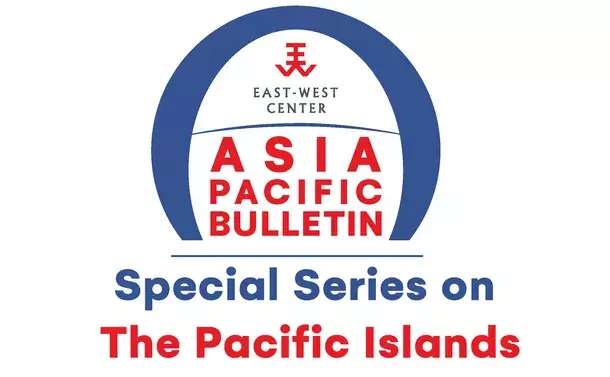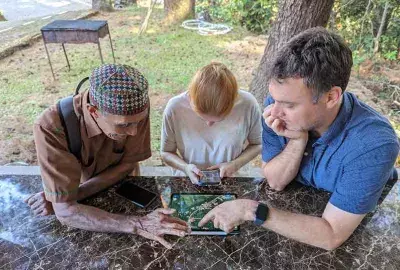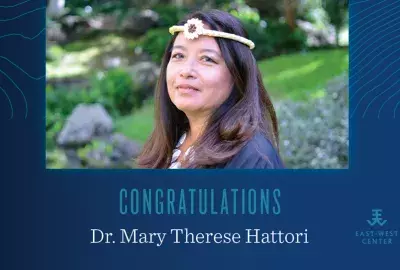
The East-West Center is proud to present this special series on the Pacific Islands as a part of our ongoing effort to serve as a platform for Pacific Island voices, analyze the pressing issues affecting the region, and highlight the importance of US territories and allies in the Pacific.
No Time to Lose: Renew the Compacts of Free Association
Emil Friberg, PhD, Adjunct Professor at Georgetown University, former Assistant Director/Senior Economist at US GAO, explains that "[a]nnual US Compact assistance is a strategic bilateral connection at a time of mounting security concerns."
US-Japan Development Cooperation for Stability and Prosperity in the Pacific Islands Region
Mr. Hideyuki Shiozawa, Senior Program Officer, Pacific Island Nations Program Team, Ocean Policy Research Institute, the Sasakawa Peace Foundation, accounts for regional complexities and Japan-US synergies as he outlines possible structures for Japan-US trilateral development cooperation with Pacific Island partners.
The COVID-19 Pandemic In Oceania: Health Policy Decisions Matter
Neal A. Palafox, MD, MPH, & Wilfred C. Alik, MD, clinicians who have worked over two years on multiple Hawaii State based COVID-19 response teams and assisted with COVID-19 repatriation efforts in the Republic of the Marshall Islands and American Samoa, "articulate a disparate range of pandemic experiences across Pacific Island countries and territories (PICTs), in terms of COVID 19 community transmission, cases, mortality, and vaccination rates."
Clean Energy Transitions in the Pacific Islands Present Opportunities for Strategic US Economic Partnerships
Dr. Kalim U. Shah, Professor of Energy and Environmental Policy and Director of the Island Policy Lab, Joseph R. Biden Jr. School of Public Policy and Administration, University of Delaware, explains that with some locales "targeting as much as 100% renewables for their energy mix… [t]he modernization of the Pacific Islands’ energy sector promises to strengthen local economies and enhance the quality of life for residents"
Understanding the Political Anatomy of the “Forward Edge”: The Case of Guam
Kenneth Gofigan Kuper, PhD, Assistant Professor of Political Science and Micronesian Studies at the University of Guam and Director of the Pacific Center for Island Security, dissects the political anatomy of Guam and explores the interplay between the island's status as a US territory and key US strategic concerns in the Pacific.
FSM Engagement With The United States And China: A Lesson Learned For The Pacific Islands
Dr. Gonzaga Puas, Professor at Pacific Islands University and Founder of Micronesia Institute of Research and Development, explains that the Federated States of Micronesia (FSM) is at a "junction, where the confluence of the two super-powers [the United States and China] meet... FSM is aware of its strategic importance and is judiciously managing the influence of both superpowers."
Elevating and Engaging Micronesian Expertise in Hawai‘i and Oceania
Dina Shek, JD, & Shanty Sigrah Asher, JD, legal professionals who have served as advocates and organizers for the Micronesian community, explain the importance of including indigenous expertise in policymaking and outlines steps to be more inclusive of Micronesian voices in policy formulation.
A Micronesian Perspective on Migration to the United States: Salty Feet Among Fellow People of the Sea
James A. Naich & Mary Therese Perez Hattori, EdD, a former Federated States of Micronesia diplomat and current East-West Center Diplomatic Consultant and Interim Director of the Pacific Islands Development Program at the East-West Center, respectively.
The East-West Center is proud to present this special series on the Pacific Islands as a part of our ongoing effort to serve as a platform for Pacific Island voices, analyze the pressing issues affecting the region, and highlight the importance of US territories and allies in the Pacific.
No Time to Lose: Renew the Compacts of Free Association
Emil Friberg, PhD, Adjunct Professor at Georgetown University, former Assistant Director/Senior Economist at US GAO, explains that "[a]nnual US Compact assistance is a strategic bilateral connection at a time of mounting security concerns."
US-Japan Development Cooperation for Stability and Prosperity in the Pacific Islands Region
Mr. Hideyuki Shiozawa, Senior Program Officer, Pacific Island Nations Program Team, Ocean Policy Research Institute, the Sasakawa Peace Foundation, accounts for regional complexities and Japan-US synergies as he outlines possible structures for Japan-US trilateral development cooperation with Pacific Island partners.
The COVID-19 Pandemic In Oceania: Health Policy Decisions Matter
Neal A. Palafox, MD, MPH, & Wilfred C. Alik, MD, clinicians who have worked over two years on multiple Hawaii State based COVID-19 response teams and assisted with COVID-19 repatriation efforts in the Republic of the Marshall Islands and American Samoa, "articulate a disparate range of pandemic experiences across Pacific Island countries and territories (PICTs), in terms of COVID 19 community transmission, cases, mortality, and vaccination rates."
Clean Energy Transitions in the Pacific Islands Present Opportunities for Strategic US Economic Partnerships
Dr. Kalim U. Shah, Professor of Energy and Environmental Policy and Director of the Island Policy Lab, Joseph R. Biden Jr. School of Public Policy and Administration, University of Delaware, explains that with some locales "targeting as much as 100% renewables for their energy mix… [t]he modernization of the Pacific Islands’ energy sector promises to strengthen local economies and enhance the quality of life for residents"
Understanding the Political Anatomy of the “Forward Edge”: The Case of Guam
Kenneth Gofigan Kuper, PhD, Assistant Professor of Political Science and Micronesian Studies at the University of Guam and Director of the Pacific Center for Island Security, dissects the political anatomy of Guam and explores the interplay between the island's status as a US territory and key US strategic concerns in the Pacific.
FSM Engagement With The United States And China: A Lesson Learned For The Pacific Islands
Dr. Gonzaga Puas, Professor at Pacific Islands University and Founder of Micronesia Institute of Research and Development, explains that the Federated States of Micronesia (FSM) is at a "junction, where the confluence of the two super-powers [the United States and China] meet... FSM is aware of its strategic importance and is judiciously managing the influence of both superpowers."
Elevating and Engaging Micronesian Expertise in Hawai‘i and Oceania
Dina Shek, JD, & Shanty Sigrah Asher, JD, legal professionals who have served as advocates and organizers for the Micronesian community, explain the importance of including indigenous expertise in policymaking and outlines steps to be more inclusive of Micronesian voices in policy formulation.
A Micronesian Perspective on Migration to the United States: Salty Feet Among Fellow People of the Sea
James A. Naich & Mary Therese Perez Hattori, EdD, a former Federated States of Micronesia diplomat and current East-West Center Diplomatic Consultant and Interim Director of the Pacific Islands Development Program at the East-West Center, respectively.







